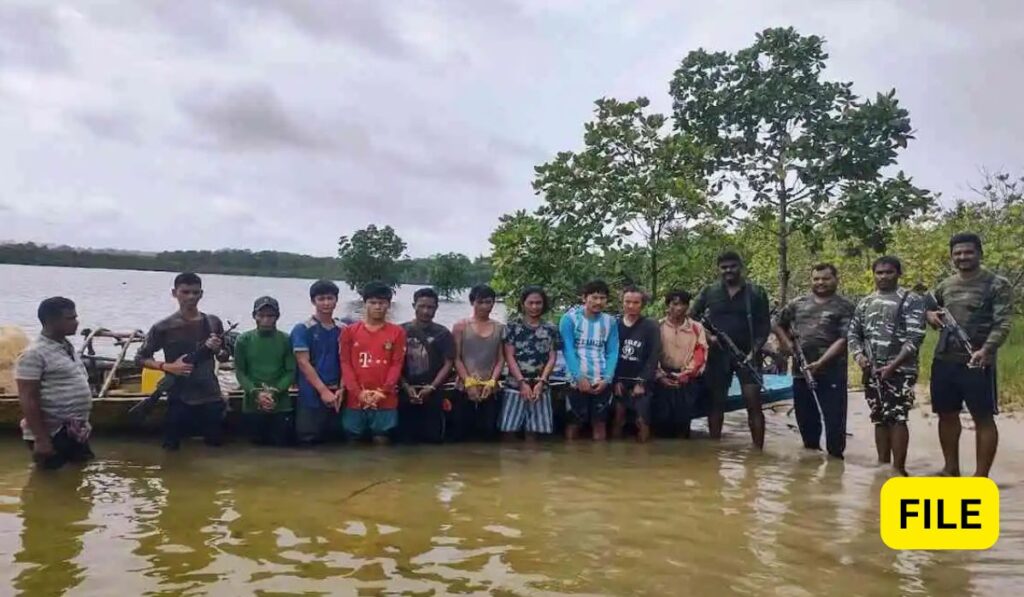Tarun Karthick
Sri Vijaya Puram, 21 October 2024
The Andaman and Nicobar Police recently arrested two local residents of Bambooka Island in Nicobar District for allegedly providing logistical support to Myanmarese poachers. The arrests were made as part of ongoing efforts to combat illegal poaching activities in the remote, isolated islands of the Union Territory.
While the issue of poaching by Myanmarese nationals is not new, it remains a significant threat to the ecological balance and natural resources of the Andaman and Nicobar Islands. Every year, several Myanmarese poachers are apprehended in anti-poaching operations conducted by the Andaman and Nicobar Police, Indian Coast Guard, and other agencies. However, the arrest of local residents for aiding these poachers has brought a fresh wave of concern, raising questions about the broader implications of these incursions.
Poaching and Beyond: A Growing Concern
While poaching itself is alarming due to its impact on the biodiversity of the Andaman and Nicobar Islands, the issue has taken on a new dimension in light of Myanmar’s current political instability. Since the 2021 military coup, the country has been embroiled in civil conflict, with lawlessness spreading in several regions. More troubling is Myanmar being a part of the ‘Golden Triangle’, a notorious region comprising parts of northeastern Myanmar, northwestern Thailand, and northern Laos, which is known as one of the world’s largest producers of opium and methamphetamine.
Shan State in Myanmar, in particular, is regarded as the largest methamphetamine-producing region globally. The concern now is that Myanmarese poachers entering the Andaman and Nicobar Islands may not be limited to illegal fishing or hunting but could also be involved in drug smuggling operations. Though authorities have not yet caught poachers with narcotics, the potential for smuggling remains a real and growing threat.
A Looming Drug Smuggling Crisis?
There have already been unsettling signs of drug activity in the Andaman and Nicobar Islands. In recent months, packets of drugs, including cocaine and heroin, have washed ashore on islands such as Tilangchong and Great Nicobar. These instances mark the first time that such high-profile narcotics have been found in the region, adding to fears that the islands may become a new transit point for international drug trafficking networks.
While the direct involvement of poachers in drug smuggling has not yet been confirmed, it may only be a matter of time before these individuals—who are already operating illegally in the region—start to exploit the opportunity to transport narcotics for greater financial gain.
Call for Action: Strengthening Border Security
Given the vast and difficult-to-patrol expanse of the Andaman and Nicobar Islands, it is clear that traditional methods of surveillance and enforcement are not enough to fully tackle this growing threat. With poachers increasingly brazen in their incursions, and the potential for drug smuggling on the rise, the Indian government must invest in modern technological solutions to bolster security across the islands.
Advanced monitoring systems, including the use of satellite imagery and drones, could help detect poaching activities in real-time without relying solely on local reports or intermittent patrols. Such technologies would not only aid in preventing the illegal harvesting of the islands’ resources but could also serve as an early warning system for possible drug trafficking routes.
While the challenges are significant, the stakes are even higher. The Andaman and Nicobar Islands, with their rich biodiversity and strategic location, are increasingly at risk of becoming a focal point for international criminal activities. As authorities continue to crack down on poaching, the potential for these operations to expand into drug smuggling remains a critical issue that must be addressed urgently.
The Way Forward
Local law enforcement and coast guard operations, though vigilant, cannot cover every inch of the vast Andaman Sea. However, with the right technological investments and increased international cooperation, it is possible to curb both poaching and the potential for drug smuggling before these illegal activities become entrenched in the region.
The arrests of Bambooka Island residents serve as a reminder that the problem of poaching has evolved into a multifaceted security concern. What might begin as a battle to protect natural resources could soon become a larger fight against international drug smuggling. Authorities must act swiftly to prevent this threat from materialising.

